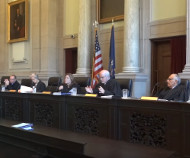8/18/2017
Maine Supreme Court: Father Cannot Help Son Fight Traffic TicketCops can play the role of prosecutor in a Maine traffic court, but a dad cannot help his son fight a ticket.

A father who wanted to represent his teenage son while fighting a traffic ticket will not be allowed to do so under a ruling handed down Thursday by the Maine Supreme Judicial Court. On July 4, 2016, Benjamin J. Rupert had been pulled over at U.S. Route 1 and Old Blue Point Road in Scarborough. Officer Melissa DiClemente accused the eighteen-year-old of exceeding the 35 MPH speed limit and "failure to maintain control."
When the case came before a Portland District Court judge, Rupert filed a motion asking to be able to represent himself with the assistance of his father. The judge refused to allow the dad to play any role in the proceedings because he does not have a law license.
Once the trial resumed, the judge sided with the testimony of Officer DiClemente and imposed a $300 penalty on the young driver. Rupert appealed, but the state's highest court was no more sympathetic to his cause.
"Contrary to Rupert's contention, there is no legal authority in Maine -- constitutional or otherwise -- that creates a right for him to be represented in this matter by a person, not licensed to practice law in Maine, who would not merely provide silent support, but would act as an advocate -- to participate, in other words, as a licensed attorney would," Justice Jeffrey L. Hjelm wrote for the court.
Prior to 1931, it was legal for "any citizen of good moral character" to represent an individual in court, even without being a member of the Maine bar. The legislature deleted that exception to protect lawyers from unlicensed competition.
Under the Sixth Amendment to the US Constitution, individuals have the right to "the assistance of counsel" for their defense in court. Rupert pointed out that the police officer, who has no law license either, is allowed to play the role of a prosecutor in court on the state's behalf. The justices saw no constitutional violation because the state made the traffic ticket a civil, not criminal matter.
"Therefore, contrary to Rupert's contention, no fundamental right was affected by the court's denial of his request to be represented by his father, and consequently the application of the statutory provision allowing the law enforcement officer, who was not a licensed attorney, to represent the state did not rise to the level of an equal protection violation," Justice Hjelm concluded. "Because Rupert has not identified any federal or state constitutional provision, statute, or common law authority contravened by the court when it denied his request to be represented by a person not authorized to practice law in Maine, we affirm the judgment."
A copy of the ruling is available in a 60k PDF file at the source link below.


